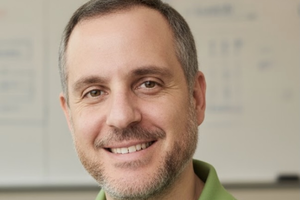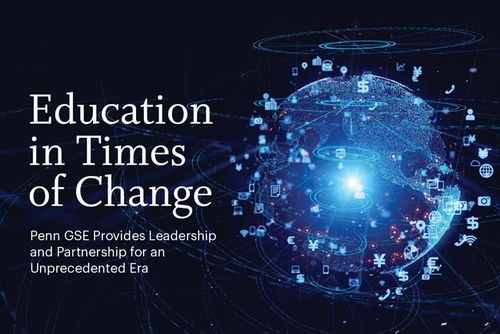
Photo Credit: Image by iStock.com/metamorworks
by Juliana Rosati
This article originally appeared in the Fall 2020 issue of The Penn GSE Magazine, which went to print on October 22, 2020.
Amid the worst pandemic in a century and perhaps the largest civil rights movement in U.S. history, the field of education is operating in a dramatic and unprecedented environment. Across K–12 and higher education, the abrupt shift to virtual education during tumultuous times has brought vast challenges and opportunities related to learning, mental health, access, and equity. In this landscape, Penn GSE has applied its expertise to move education forward within the School, across the nation, and around the world.
“I have been incredibly proud of how Penn GSE has responded, in terms of orchestrating our own move to remote teaching, stepping up to provide resources to educators and leaders in the field at large, and addressing issues of race, equity, and access throughout our work,” says Penn GSE Dean Pam Grossman.
In March, the School engineered a rapid and sophisticated transition to virtual education. In June, Penn GSE’s Committee on Race, Equity, and Inclusion hosted two School-wide meetings to respond to the police killings of Black people and envision next steps for the School’s longstanding work in race, equity, and inclusion.
Since the beginning of the pandemic, Penn GSE has quickly channeled its knowledge and strengths outwards to lead and partner with educators at all levels—through its partnership with The School District of Philadelphia, its professional development offerings for educators near and f
ar, and two groundbreaking new projects funded by the Harold W. McGraw, Jr. Family Foundation to offer mental health and leadership guidance to K–12 educators and leaders for the road ahead.
“Many of us who have been working in education innovation for decades realized that this is the moment where the disruption is so great that it forces us to leap into the future,” says Michael Golden, GRD’07, senior fellow and executive director of Catalyst @ Penn GSE, the School’s hub for innovation.
Throughout the process, Penn GSE has relied on the strength and power of community to meet the demands of unpredictable times.
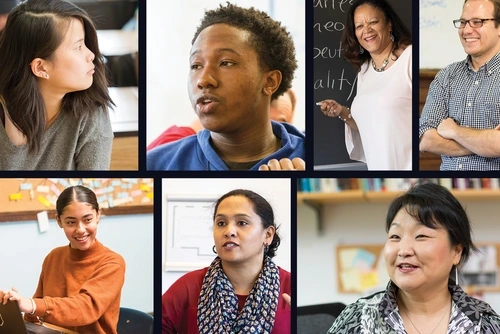
Embracing the Shift to Virtual Education
As schools, colleges, and universities across the country, including Penn, made an unprecedented shift to virtual education in March to curb the spread of COVID-19, Penn GSE drew upon its considerable in-house expertise to give students a high-quality experience.
“Almost immediately we created an ad hoc committee to help our colleagues pivot to teaching remotely,” says Dr. Matthew Hartley, professor and associate dean for academic affairs.
The group, led by Hartley, included Dr. Golden; Betty Chandy, GED’05, GRD’13, director of online learning for Catalyst @ Penn GSE; Dr. Amy Stornaiuolo, associate professor in the Literacy, Culture, and International Education division; and Dr. Annie McKee, senior fellow and director of the PennCLO program.
“We have tremendous expertise across Penn GSE in the design and cultivation of learning environments,” says Golden. Catalyst produced an initial set of seven videos led by Dr. Chandy, who applied her experience preparing K–12 and higher education instructors to teach online through Penn GSE’s VOLT (Virtual Online Learning and Teaching) certificate program, considered the first of its kind.
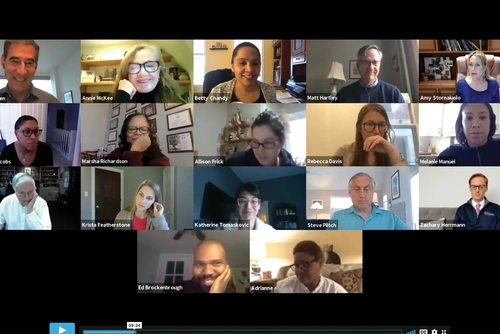
“We wanted to help all of our faculty understand the affordances and possibilities of the platforms and tools available to them,” says Chandy. In the videos, she discussed how best to use learning management and video conferencing platforms and supplement them with apps and tools. Chandy, Stornaiuolo, and Sharon Ravitch, GR’00, professor of practice, also addressed best online pedagogical practices.
When the spring semester concluded, feedback was positive. “Some students said that classes got even better because their professors were so creative in thinking about what they could do online,” reports Dean Grossman.
As it became clear that the summer and fall semesters would also be virtual, the committee provided in-depth guidance on designing courses to be virtual from start to finish. A five-workshop series, also made available as videos, covered course design, community building, classroom practices, and more.
An overarching theme was how to balance synchronous, or live, class sessions with asynchronous activities that students can undertake on their own schedules. Lectures, for example, can tax attention spans when presented live online as part of a longer class session and may be best viewed asynchronously via video recordings. Other asynchronous activities might include discussion boards and multimedia platforms for sharing ideas and images. On the other hand, live, synchronous discussions can be essential for building community and engagement. The balance might differ depending on an instructor’s learning objectives and the type of course, such as a seminar emphasizing discussion or a project-based learning class designed around small-group work.
Chandy is optimistic about the capabilities of virtual education to support and even enhance opportunities for students to drive and shape learning. “So many faculty members are seeing value in digital tools in terms of helping students see each other’s ideas,” she says. “I think we’re going to have even more student-centered learning environments as a result of this experience.”
The growing library of videos has been posted on Penn GSE’s Teaching Remotely webpage. Training documents, along with individual consultations with the Penn GSE Information Technology Department, were also made available to faculty. Open Q&A sessions allowed faculty across the School to share their own best practices. Discussion addressed a range of issues impacting students, including time zone differences, limitations to technological access, sensitivities about appearing on video, and the need to compensate for social opportunities that would happen organically in person.
Penn GSE faculty and staff met virtually for a series of workshops on teaching remotely during the transition to virtual instruction. As schools, colleges, and universities across the country, including Penn, made an unprecedented shift to virtual education in March to curb the spread of COVID-19, Penn GSE drew upon its considerable in-house expertise to give students a high-quality experience.
“Everybody wants to make this work, and we are so committed to bringing the best possible experience to our students,” says Dr. Susan A. Yoon, professor in the Teaching, Learning, and Leadership division, whose research in the learning sciences has long developed digital learning environments. “It’s heartening to see that we’re all sort of banding together. What a way to create community—it’s amazing.”
Faculty have also considered together how class discussions can respond to current events. “One of the things that has united us is the importance of always attending to our classes as communities of learners who want to produce positive change in the world,” says Hartley. “At a moment in time when we’re trying to figure out what kind of country and world we want to have, it’s important to provide an environment where people can have those kinds of conversations.”
Leading the Field Locally, Nationally, and Globally
Throughout the seismic shifts in the nation and world since the spring, Penn GSE has kept its attention outwards, providing partnership and resources for educators through existing programs while also expanding the School’s reach.
“We got a very clear message from the dean that Penn GSE needs to be responsive and be of service at this time. We knew we had a role to play,” says Dr. Zachary Herrmann, executive director of the Center for Professional Learning and director of the Project-Based Learning Certificate Program.
Faculty have offered their expertise through The Educator’s Playbook, a newsletter for K–12 educators and parents, and national media outlets. In particular, Dr. Howard Stevenson, Constance Clayton Professor of Urban Education and professor of Africana studies, has been widely interviewed on his work in racial literacy.
“An initial step towards social change is sitting with racial discomfort. Unfortunately, without stress management tools, no one really does that very well,” says Stevenson, who offered advice for educators to address the national racial climate based on his years of bringing trainings to schools and organizations. (See the Fall 2020 feature “Recasting the Moment: Professor Howard Stevenson on Creating Change through Racial Literacy” to learn more about Stevenson’s work.)
Penn GSE’s longstanding work with The School District of Philadelphia, across more than 230 schools, represents a national model of partnership between a university and an urban district and has provided an infrastructure for Penn GSE to support schools. The Responsive Math Teaching project, which helps improve math instruction in the thirteen elementary schools in West Philadelphia, immediately moved all of its professional development and coaching for District teachers online—and changed its content for the new reality.
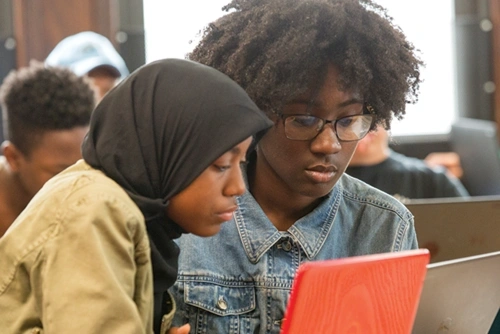
“We’re helping teachers figure out how to teach math in a virtual environment, which has been an urgent need,” says Dr. Caroline Watts, director of the Office of School and Community Engagement and senior lecturer, who oversees Penn GSE’s partnership with the District.
Similarly, the Philadelphia Writing Project (PhilWP), based at Penn GSE, quickly moved its programs for teachers and students online and undertook new efforts—including a teachers’ study group about virtual writing instruction, summer lessons for children, and 1,500 writing kits delivered to students and families at partner schools.
“Kids are stuck in the house, so we want to give them as many exciting learning experiences as possible,” says Professor of Practice Diane Waff, C’76, GRD’07, director of PhilWP, which represents Philadelphia’s most prominent teacher network, with a community of more than eight hundred teacher consultants in the region who enhance the teaching of writing.
In these and other collaborations with the District, Penn GSE has worked to help school leaders navigate the impact on children from lower-income families, who may have lacked the technology to participate when schools went virtual, and who may also have lost critical access to food, social services, and counseling when school buildings closed.
“Everything that we’re dealing with right now is further highlighted by and further highlights inequities,” says Watts. “We work by listening to the schools and communities, learning alongside them, and connecting them with resources at Penn GSE.”
Educational, social, and health support provided by students from Penn GSE, Penn Nursing, and Penn Social Policy & Practice at Kensington Health Sciences Academy, part of a three-school collaboration called the Penn Futures Project, is being adapted to current conditions. The new principals of the Henry C. Lea Elementary School and the Penn Alexander School, both schools where Penn GSE leads University-wide partnerships, have set goals for racial justice and equity in the year ahead, and Watts is linking the schools with relevant Penn GSE resources.
Within Catalyst, the Center for Professional Learning and VOLT have adapted and expanded their nondegree professional development for working educators. As the transition to virtual learning began, the Center for Professional Learning not only redesigned its planned Summer Institutes, but also created a slate of free webinars and workshops about issues related to the pandemic, altogether reaching over 1,600 participants.
“The workshops made the resources of our community broadly accessible to educators, leaders, and caregivers around the globe,” says Herrmann. A topic that he has taught regularly in the past, “Collaboration and Conflict,” gained added resonance this year when Herrmann presented it through both the Center and his Penn GSE courses.
“I’m a Black woman, the mother of a son, and have lost people to the coronavirus,” says Penn GSE doctoral student Yulanda Essoka, associate director of diversity and inclusion at Penn Engineering, who enrolled in a summer course on the topic. “I hit the street protesting after George Floyd’s murder and started class angry, hurt, and disengaged. However, Dr. Herrmann opened class acknowledging what was going on in the world, and his small, genuine act of recognition caused me to lean in, listen, and learn. Ironically, and thankfully, the course content provided an ideal lens to scrutinize current events and conflicts that stemmed, in part, from lack of collaboration.”
“I felt confident to take ownership of my virtual classroom, provide purposeful and meaningful learning activities, and expand the ways in which my students can demonstrate their learning”
While Chandy was helping Penn GSE faculty move their classrooms online overnight, she was doing the same for educators enrolled in the VOLT program and U.S. school districts with which VOLT previously worked. For partner Aditya Birla Education Academy in India, VOLT launched a new series of trainings, the first of which reached over eight hundred educators.
“I consider myself incredibly lucky to be a part of the VOLT program as the COVID-19 crisis continues,” says participant Tara Greene, a third-grade Spanish immersion teacher at Appoquinimink School District in Middletown, Delaware. “I felt confident to take ownership of my virtual classroom, provide purposeful and meaningful learning activities, and expand the ways in which my students can demonstrate their learning.”
Supporting Practitioners on the Road Ahead
Decision making for education leaders has never been more complex as they determine when and how to reopen school buildings and campuses—and prepare to change plans on short notice. At the same time, with daily life disrupted on an unprecedented scale on multiple fronts, the need for social and emotional support for students and educators has never been more urgent.
“We’re all experiencing what’s going on in the world,” says Dr. Marsha Richardson, senior lecturer in the Human Development and Quantitative Methods division and a clinical psychologist by training. “All parts of the system are impacted by trauma.” Looking to the future, Penn GSE has prepared to reimagine and support the field in multiple ways.
As an outcome of the School-wide conversations in June, Penn GSE has established new faculty-led initiatives that build on the School’s work in race, equity, and inclusion to promote antiracism and diversity within Penn GSE and in the field of education at large. “As a school, we are committed to doing the work to address racism and other forms of oppression,” says Dean Grossman. “I am grateful that so many of us came together to share ideas about how we individually and collectively can take actions that move this work forward.”
To equip K–12 educators and leaders across the country for the complexity of the 2020-2021 academic year, Penn GSE has released two groundbreaking new resources in mental health and leadership for schools, funded by a total of $360,000 in grants from The Harold W. McGraw, Jr. Family Foundation.
“If students are struggling emotionally, that makes it hard for them to focus in school. And that is underscored in this era of virtual learning, because students are taken out of physical proximity to each other, where social development occurs,” says Dr. Michael J. Nakkula, professor of practice in the Human Development and Quantitative Methods division. Nakkula and his team from the Project for Mental Health and Optimal Development have led the creation of “Planning for Uncertainty: An Educator’s Guide to Navigating the COVID-19 Era,” one of the two McGraw-funded projects.
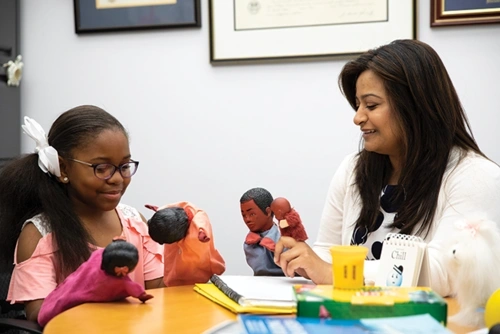
Intended as a user-friendly document to help educators navigate the social and emotional aspects of the new academic year, the guide examines scenarios adapted from real-life situations in schools. For example, a student who was performing well in school begins to disconnect from virtual classes, an educator struggles to cope with being at risk for COVID-19, and the national and global environment of high anxiety disrupts students’ learning.
“It’s meant to help you realize the things you can control and the things you can’t, and see possibilities to innovate and support optimal development in suboptimal conditions,” says Andy Danilchick, GED’98, director of the guide project and of the Project for Mental Health and Optimal Development, an initiative through which he and Nakkula work with schools and educators locally and globally.
The guide aims to help educators foster an “uncertainty mindset” to address changing circumstances with adaptable solutions and respond to needs as they emerge. The scenarios have been developed by a team of educators, many in Philadelphia and New York, with input from Penn GSE’s Caroline Watts and Julie Berger, GED’13, GED’19, senior research coordinator of the Office of School and Community Engagement.
“Our focus is on moving educators from inaction to action through a process of dialogue and reflection, with a focus on equitable practice,” says Miranda Wenhold, GED’20, manager of the guide project.
For school leaders, decision-making processes are undergoing a severe test—and practice collaborating makes a difference. “There are inequities in the decision-making capacities of school systems,” says Dr. Jonathan A. Supovitz, professor in the Education Policy division. “If you didn’t have established structures and practices for collaborative decision-making, and you got thrust into this situation where a lot of people had to communicate quickly to come up with a coherent response to the crisis, your ability to respond was much weaker.”
“If students are struggling emotionally, that makes it hard for them to focus in school. And that is underscored in this era of virtual learning, because students are taken out of physical proximity to each other, where social development occurs.”
As leader of “Leading Improvement in Challenging Times,” the other McGraw-funded project, Supovitz has produced a guide and animated video to give educational leaders the practice they need in collaborating to create, test, and adapt solutions to problems. The video simulates the interactions of a leadership team and provides commentary from several graduates of Penn GSE’s Mid-Career Doctoral Program in Educational Leadership.
These materials and the “Planning for Uncertainty” guide were released to U.S. schools for the 2020 back-to-school season, with a combined potential reach estimated at 14 million students. During the academic year, each project will release professional development resources and provide coaching to approximately 100,000 educators. The hope is that in addition to guidance for a time of crisis, the projects will impart skills and processes that remain useful in calmer times. “We’ve built this to be durable,” says Supovitz.
Catalyst oversees the projects and continues to create conversation about the future of education through multiple channels. These include the Milken-Penn GSE Education Business Plan Competition and The Harold W. McGraw, Jr. Prize in Education, which offer year-round programming as well as annual events that went virtual this fall. EDTECH WEEK 2020, a four-day virtual event produced by Catalyst and StartEd® in June, drew four thousand educators, entrepreneurs, funders, investors, and researchers. A key outcome from one session was a white paper about innovation for higher education leaders, “Is Academic Innovation Mission Critical or Crisis Driven? Nine Questions that Matter,” generated by a think tank of college and university leaders and cowritten by Dr. Peter Eckel, senior fellow in Penn GSE’s Higher Education division.
“We’re hoping that we can leverage what the disruption has surfaced, which is this underlying dichotomy of advantage and disadvantage, and the heightened awareness of systemic racism,” says Golden. “We can envision a future where people are proactively working to make change happen, and no longer willing to perpetuate a system that hasn’t served all students and all learners.”
From modeling best practices in the shift to virtual education to supporting and shaping the field of education locally, nationally, and globally, Penn GSE has demonstrated the strengths and adaptability that will be needed for the unfamiliar road ahead. “If this period has taught me anything, it is that the Penn GSE community is a resilient and generous one,” says Dean Grossman.
This article appeared in the Fall 2020 issue of The Penn GSE Magazine.



